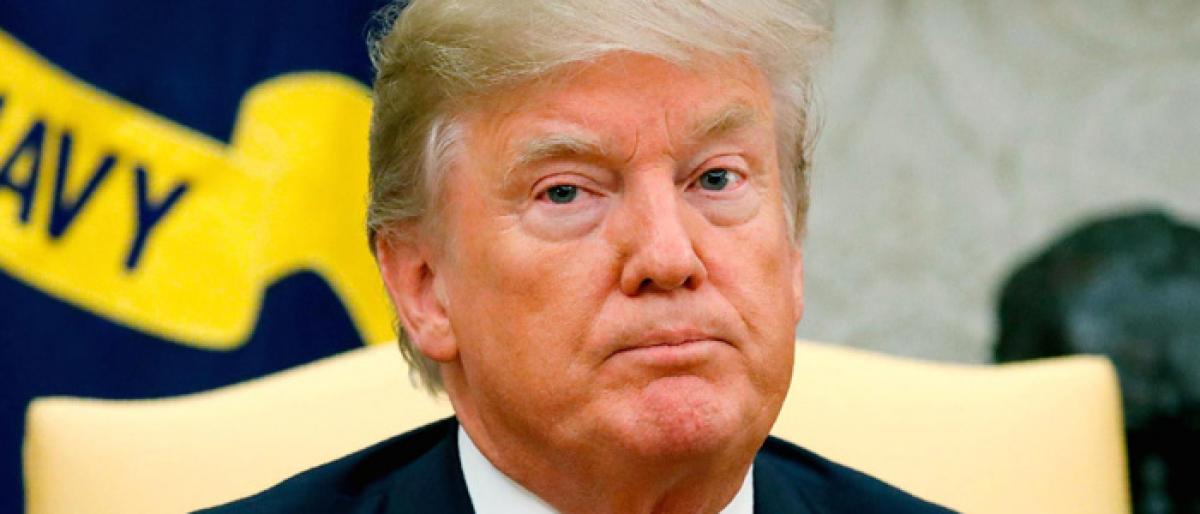Live
- A constable who helped an old woman in a very dangerous place
- WBSSC Claims Eligibility For 19,000 Dismissed Staff Amidst Teacher Recruitment Scandal
- Tollywood’s shifting landscape: The growing influence of OTT platforms
- YSR Congress Party MLA candidate KK Raju campaigns in 23rd Ward Priyadarshini Colony
- Leaders and Residents Welcome TDP Candidates Pulivarthi Nani and Daggumalla Prasada Rao in Tirupati
- 30 Families Switch Allegiance from YSR Congress to Telugu Desam Party in Batladinne Village
- Mannara Chopra’s refreshing photoshoot brings summer vibes
- Vishal’s thriller ‘Rathnam’ clears censor; all set to hit theatres
- Rashmika wraps up key schedule of Dhanush’s ‘Kubera’
- Cycling vs walking: Which is better for weight loss?
Just In

US President Donald Trump’s decision last week to impose 25 per cent tariff on Chinese imports worth over $65 billion wasn’t entirely unexpected as it came close on the heels of his previous controversial initiative to levy tariffs on steel and aluminium imports into his country. Some analysts ruled out any major financial impact of the Trump’s latest move on global trade. In a way, they are right
US President Donald Trump’s decision last week to impose 25 per cent tariff on Chinese imports worth over $65 billion wasn’t entirely unexpected as it came close on the heels of his previous controversial initiative to levy tariffs on steel and aluminium imports into his country. Some analysts ruled out any major financial impact of the Trump’s latest move on global trade. In a way, they are right.
Chinese growth story doesn’t solely depend on exports which account for just 18 per cent of its GDP. Further, exports to US from China are less than three per cent of latter’s GDP. Going by this, imports worth $60 billion make up just 0.25 per cent of China’s GDP. Therefore, the overall financial impact on China will be negligible.
But China did not remain silent. It retaliated by announcing import tariffs on American products worth $3 billion.
But one thing is crystal clear. It’s unlikely that US-China trade war will end here. There is every chance that it will escalate further as the US has already said that Chinese imports have cost it 2 million jobs.
The global superpower also claimed that China’s unfair trade practices had led to a goods trade deficit of $370 billion between the US and China. So, we will see more import tariffs from the US and retaliation from China in equal measure.
Though there is no immediate financial impact of the US-China trade war on global trade, increasing protectionist tendencies will obviously have wider ramifications for global economy. That’s reason why global stock markets went into a tailspin after the US announcement last week. Naturally, there will be material impact on global trade if the US imposes more tariffs and other countries join it.
However, there is no point in blaming the US for what it’s doing now. Globalisation allowed countries with low manufacturing costs and low salaries such as China to dump cheaper imports on the developed countries. As a consequence, the US and several other developed countries lost competitive advantage because of higher wages and high manufacturing costs.
The result: Most of the manufacturing activity shifted from the US to low-cost destinations like China. This has led to large-scale job losses in the US. Increasing number of immigrants added fuel to the fire, stoking discontent among locals. Sensing this, Trump promised during 2016 elections that he would reverse the trend. That promise titled scales in his favour and helped him win. In a way, he is implementing his promise now.
But will the escalating trade war between the US and China impact India in anyway? It is very unlikely that there will be any immediate impact. But as industry body Assocham said, Indian economy will also suffer if these protectionist measures escalate into a full-fledged global trade war. It goes without saying that the country’s exports will come down.
Consequently, India’s current account deficit (CAD), which reached $13.5 billion or 2 per cent of GDP in December quarter, will increase further. Nonetheless, the key takeaway from the current trade war is that globalisation is on a backfoot now and it’s better for countries to reduce their reliance on exports.

© 2024 Hyderabad Media House Limited/The Hans India. All rights reserved. Powered by hocalwire.com







